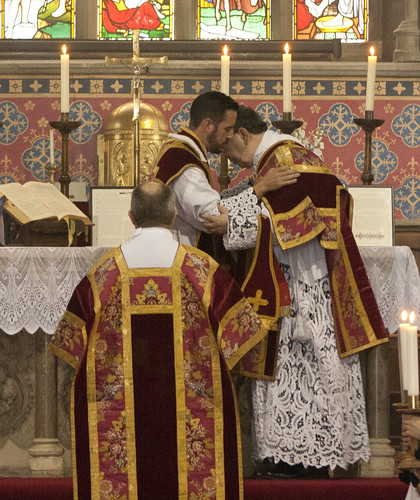 |
| One of my favourite liturigical rituals, and one of the most dramatic and expressive: the kiss of peace at High mass. |
Most Freemasons of my acquaintance are traditionalists in the sense that they value and appreciate traditional values, especially morality, so might there not be scope for traditional Catholics and Freemasons to be allies in the fight against the advance of inappropriate modernism? We could still agree to disagree on details of doctrine (Freemasonry is not, and does not claim to be, a religion).
In light of the Church's condemnations, the prospect seems a dim one. Perhaps Freemasonry may be a promising field for evangelisation. However, my experience of people who regard themselves as guardians of 'traditional values' outside the Church is that there is usually a lot less to this than meets the eye. A classic position of liberal elites shoring up the established order is trying to stop people not-like-us reproducing: the poor, the stupid, members of less favoured ethnic groups. I wonder what masons think about issues like that. Maybe they'll tell me in the combox.
All the same, the last word should go to Walton Hannah.
In general, Freemasonry is Scotland is more popular and relatively far more numerous than in England, partly because it tends to be cheaper, and because austere Presbyterianism has eliminated most of the colour, glamour, and ceremonial from Christian worship. When the soul is starved of these elements in religion, it will naturally tend to compensate for them itself in less desirable ways. It is not only the hostility of Rome that has left Masonry weak in Catholic countries.
Darkness Visible pp257-8.
Support the work of the LMS by becoming an 'Anniversary Supporter'.
In 1981 I was approached by someone (who was more of an acquaintance than a friend) who offered to introduce me into the 'Craft'. I pointed out to him that I was a Catholic. His reply was that English lodges, as opposed to Scottish ones, admitted 'Roman Catholics'.
ReplyDeleteI had to point out to him that this was beside the point, since under Canon Law adherence to the Masons would incur excommunication latae sententiae (which was the case under the 1917 Code, then still in force).
The situation was more complex in France and Germany where one could find in the 18th century "Catholic" lodges. The figure of Martines de Pasqually is key is this regards as much as his disciple Saint-Martin, who ultimately moved away from the ritualism of his master to end up with a dubious spiritualism. Jean-Baptiste tried to continue the movement and was responsible for the creation of the Rite Ecossais Rectifié (RER), which included some of the rituals of Martines de Pasqually.To this day the RER claims to be explicitly "Catholic". Joseph de Maistre,among other things, one of the fathers of modern ultramontanism, was deeply engaged in "mystical" "Catholic" masonry.
ReplyDeleteThis comment has been removed by the author.
ReplyDelete